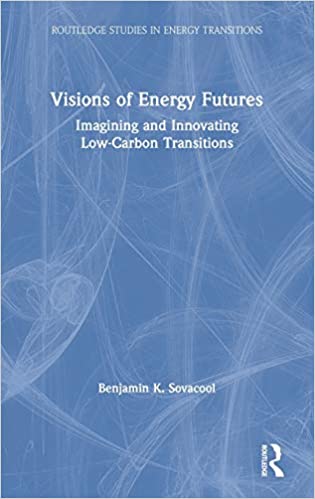
This book examines the visions, fantasies, frames, discourses, imaginaries, and expectations associated with six state-of-the-art energy systems―nuclear power, hydrogen fuel cells, shale gas, clean coal, smart meters, and electric vehicles―playing a key role in current deliberations about low-carbon energy supply and use.
Visions of Energy Futures: Imagining and Innovating Low-Carbon Transitions unveils what the future of energy systems could look like, and how their meanings are produced, often alongside moments of contestation. Theoretically, it analyzes these technological case studies with emerging concepts from various disciplines: utopianism (history of technology), symbolic convergence (communication studies), technological frames (social construction of technology), discursive coalitions (discourse analysis and linguistics), sociotechnical imaginaries (science and technology studies), and the sociology of expectations (innovation studies, future studies). It draws from these cases to create a synthetic set of dichotomies and frameworks for energy futures based on original data collected across two global epistemic communities― nuclear physicists and hydrogen engineers―and experts in Eastern Europe and the Nordic region, stakeholders in South Africa, and newspapers in the United Kingdom. This book is motivated by the premise that tackling climate change via low-carbon energy systems and practices is one of the most significant challenges of the twenty-first century, and that success will require not only new energy technologies, but also new ways of understanding language, visions, and discursive politics. The discursive creation of the energy systems of tomorrow are propagated in polity, hoping to be realized as the material fact of the future, but processed in conflicting ways with underlying tensions as to how contemporary societies ought to be ordered.
This book will be essential reading for students and scholars of energy policy, energy and environment, and technology assessment.
Dit boek onderzoekt de visies, fantasieën, frames, discoursen, denkbeelden en verwachtingen die geassocieerd worden met zes state-of-the-art energiesystemen – kernenergie, waterstofbrandstofcellen, schaliegas, schone steenkool, slimme meters en elektrische voertuigen – die een sleutelrol spelen in de huidige discussies over koolstofarme energievoorziening en -gebruik.
Visies op energietoekomst: Imagining and Innovating Low-Carbon Transitions onthult hoe de toekomst van energiesystemen eruit zou kunnen zien, en hoe hun betekenissen worden geproduceerd, vaak naast momenten van contestatie. Theoretisch worden deze technologische casestudies geanalyseerd met opkomende concepten uit verschillende disciplines: utopisme (geschiedenis van de technologie), symbolische convergentie (communicatiewetenschappen), technologische frames (sociale constructie van technologie), discursieve coalities (discoursanalyse en linguïstiek), sociotechnische verbeelding (wetenschaps- en technologiewetenschappen) en de sociologie van verwachtingen (innovatie- en toekomststudies). Op basis van deze casestudies wordt een synthetisch geheel van dichotomieën en raamwerken voor energietoekomst gecreëerd, gebaseerd op originele gegevens die werden verzameld in twee wereldwijde epistemische gemeenschappen – kernfysici en waterstofingenieurs – en deskundigen in Oost-Europa en de Scandinavische regio, belanghebbenden in Zuid-Afrika en kranten in het Verenigd Koninkrijk. Dit boek is gemotiveerd door de vooronderstelling dat het aanpakken van klimaatverandering via koolstofarme energiesystemen en -praktijken een van de belangrijkste uitdagingen van de eenentwintigste eeuw is, en dat voor succes niet alleen nieuwe energietechnologieën nodig zijn, maar ook nieuwe manieren om taal, visies en discursieve politiek te begrijpen. De discursieve schepping van de energiesystemen van morgen wordt in de politiek gepropageerd, in de hoop gerealiseerd te worden als het materiële feit van de toekomst, maar verwerkt op tegenstrijdige manieren met onderliggende spanningen over hoe hedendaagse samenlevingen geordend zouden moeten worden.
Dit boek zal essentiële lectuur zijn voor studenten en wetenschappers op het gebied van energiebeleid, energie en milieu, en technologie-evaluatie.
Geef een reactie
Je moet ingelogd zijn op om een reactie te plaatsen.